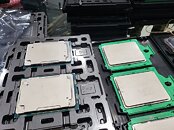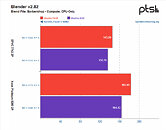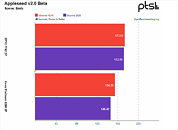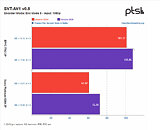Raevenlord
News Editor
- Joined
- Aug 12, 2016
- Messages
- 3,755 (1.21/day)
- Location
- Portugal
| System Name | The Ryzening |
|---|---|
| Processor | AMD Ryzen 9 5900X |
| Motherboard | MSI X570 MAG TOMAHAWK |
| Cooling | Lian Li Galahad 360mm AIO |
| Memory | 32 GB G.Skill Trident Z F4-3733 (4x 8 GB) |
| Video Card(s) | Gigabyte RTX 3070 Ti |
| Storage | Boot: Transcend MTE220S 2TB, Kintson A2000 1TB, Seagate Firewolf Pro 14 TB |
| Display(s) | Acer Nitro VG270UP (1440p 144 Hz IPS) |
| Case | Lian Li O11DX Dynamic White |
| Audio Device(s) | iFi Audio Zen DAC |
| Power Supply | Seasonic Focus+ 750 W |
| Mouse | Cooler Master Masterkeys Lite L |
| Keyboard | Cooler Master Masterkeys Lite L |
| Software | Windows 10 x64 |
Michael Larabel over at Phoronix posted an extremely comprehensive analysis on the performance differential between AMD's Rome-based EPYC and Intel's Cascade Lake Xeons one-year after release. The battery of tests, comprising more than 116 benchmark results, pits a Xeon Platinum 8280 2P system against an EPYC 7742 2P one. The tests were conducted pitting performance of both systems while running benchmarks under the Ubuntu 19.04 release, which was chosen as the "one year ago" baseline, against the newer Linux software stack (Ubuntu 20.10 daily + GCC 10 + Linux 5.8).
The benchmark conclusions are interesting. For one, Intel gained more ground than AMD over the course of the year, with the Xeon platform gaining 6% performance across releases, while AMD's EPYC gained just 4% over the same period of time. This means that AMD's system is still an average of 14% faster across all tests than the Intel platform, however, which speaks to AMD's silicon superiority. Check some benchmark results below, but follow the source link for the full rundown.




View at TechPowerUp Main Site
The benchmark conclusions are interesting. For one, Intel gained more ground than AMD over the course of the year, with the Xeon platform gaining 6% performance across releases, while AMD's EPYC gained just 4% over the same period of time. This means that AMD's system is still an average of 14% faster across all tests than the Intel platform, however, which speaks to AMD's silicon superiority. Check some benchmark results below, but follow the source link for the full rundown.




View at TechPowerUp Main Site







